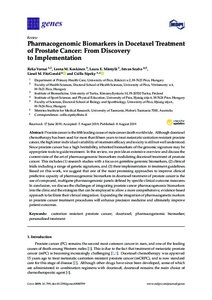Pharmacogenomic Biomarkers in Docetaxel Treatment of Prostate Cancer: From Discovery to Implementation
Reka Varnai; Leena M. Koskinen; Laura E. Mäntylä; Istvan Szabo; Liesel M. FitzGerald; Csilla Sipeky
Pharmacogenomic Biomarkers in Docetaxel Treatment of Prostate Cancer: From Discovery to Implementation
Reka Varnai
Leena M. Koskinen
Laura E. Mäntylä
Istvan Szabo
Liesel M. FitzGerald
Csilla Sipeky
MDPI
Julkaisun pysyvä osoite on:
https://urn.fi/URN:NBN:fi-fe2021042823145
https://urn.fi/URN:NBN:fi-fe2021042823145
Tiivistelmä
Prostate cancer is the fifth leading cause of male cancer death worldwide. Although docetaxel chemotherapy has been used for more than fifteen years to treat metastatic castration resistant prostate cancer, the high inter-individual variability of treatment efficacy and toxicity is still not well understood. Since prostate cancer has a high heritability, inherited biomarkers of the genomic signature may be appropriate tools to guide treatment. In this review, we provide an extensive overview and discuss the current state of the art of pharmacogenomic biomarkers modulating docetaxel treatment of prostate cancer. This includes (1) research studies with a focus on germline genomic biomarkers, (2) clinical trials including a range of genetic signatures, and (3) their implementation in treatment guidelines. Based on this work, we suggest that one of the most promising approaches to improve clinical predictive capacity of pharmacogenomic biomarkers in docetaxel treatment of prostate cancer is the use of compound, multigene pharmacogenomic panels defined by specific clinical outcome measures. In conclusion, we discuss the challenges of integrating prostate cancer pharmacogenomic biomarkers into the clinic and the strategies that can be employed to allow a more comprehensive, evidence-based approach to facilitate their clinical integration. Expanding the integration of pharmacogenetic markers in prostate cancer treatment procedures will enhance precision medicine and ultimately improve patient outcomes.
Kokoelmat
- Rinnakkaistallenteet [29335]
